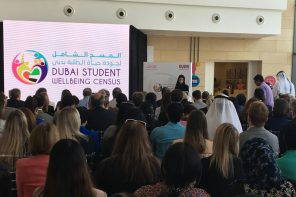Any mention of the KHDA automatically brings to mind Dr. Abdulla Al Karam. 2018 was a landmark year for the KHDA, with 10 years of school inspections under the leadership of Dr. Abdulla, who was there at the outset of the Regulator’s establishment in 2007.
Whilst it was the inspection process that initially affected the majority of schools back in 2008, and, indeed, continues to do so today, The Knowledge and Human Development Authority (KHDA)’s role and responsibilities have grown far beyond purely the academic achievement of students in Dubai’s schools. Today, the KHDA aims “to support schools, universities, parents, students, educators, investors and government partners to create a high quality education sector focused on happiness and wellbeing”.
The KHDA’s current priorities focus on increasing the number of expatriate and Emirati students attending Good or Better schools and to integrate wellbeing into the concepts and processes that define education in the emirate. It works with its local education community as well as international partners to promote positive education within all schools and universities in Dubai.
The KHDA believes the purpose of education is to prepare students for the tests of life, not just a life of tests. Positive education practices promote essential life skills and personal attributes alongside academic achievement. Qualities such as resilience, creativity, optimism, collaboration and empathy are recognised as essential for students to have in order to lead meaningful lives that will enable them to flourish.
It is this holistic approach to education – including all of the key participants – that has been driven by Dr. Abdulla in his position as Director General of the KHDA.
The KHDA under Dr Abdulla Al Karam
In 2018-19, there are close to 200 private schools in Dubai offering 17 different curricula to the around 280,000 students who attend them. In the 10 years since the KHDA started the inspection process, 86 schools having improved their overall performance judgment since their first inspection visit. Most schools have been showing steady improvements in almost all performance standards and indicators, in spite of expectations becoming more demanding over the years.
But what are the initiatives that the KHDA, under Dr. Abdulla, have launched to achieve these improvements and to provide students not only with a higher quality of education, but also a happier one?
Significant changes to the core curriculum requirements – particularly in relation to the teaching of Arabic and Islamic Studies initially, and more recently Social Studies and Moral Education, mean that all students in Dubai schools appreciate the country, culture, religion and behavioural standards of their host country. Much of these lessons are applicable for life and globally.
Initiatives such as What Works, launched in 2012, have ensured that teachers, and educators more broadly, have been able to learn from each other and to raise standards by sharing best practice across all schools – irrespective of curriculum or resources.
Teacher licensing which will impact all educators in the UAE, and is hoped to encourage more teachers to obtain their professional qualifications, as well as ensuring that students are taught by staff who can deliver the curriculum and teaching for rapidly evolving future requirements. The Unified Inspection Framework, introduced in 2015, means that schools throughout the UAE can be benchmarked for parents, teachers and students.
The Abundance Project in 2017 was a further way of sharing best practice among the best performing schools and those that needed the most support. Feedback from the project suggests that schools do not necessarily need the best resources to deliver quality education, but rather better skills.
Early recognition that happy students were likely to be higher-achieving students has led to a range of well-being initiatives and latterly, for the second year, the Well-being Census. The launch of the first Well-being Census in 2017, was a significant step towards the recognition that all concerned in education – staff, students, parents – have to be content with their environment if they are to be successful.
And the introduction of the Inclusive Education Policy in 2017, has ensured that there should be a place for every child in mainstream education who aspires to one.
In instituting these initiatives, Dr. Abdulla’s leadership has been fundamental to ensuring that the requirements for Education 2020 and the UAE National Agenda have benefited students of all backgrounds and nationalities.
In the last 10 years, the number of students attending schools rated ‘Good’ or better has more than doubled – from 30% in 2008/09 to 66% in the 2017/18 academic year. Likewise the number of Emirati students attending schools rated ‘Good’ or better has increased significantly, from 26% in 2008/09, to 62% in 2017/18.
Perhaps as importantly, over the same period, 10% less students now attend Weak schools, and 26% less students attend Acceptable schools. 9% more students are now attending Good schools, and a remarkable 27% more students attend schools that are rated Very Good or Outstanding.
As Director General, Dr. Abdulla has driven the KHDA forward, making all those involved in education in the Emirate of Dubai beneficiaries of his highly focused, inclusive, and positive approach.
Biography
Dr. Abdulla Al Karam, as Chairman of the Board of Directors and Director General of the Knowledge and Human Development Authority (KHDA), is responsible for a wide spectrum of education in Dubai’s private sector, spanning early learning, school, and higher education and training Institutes. Dr. Abdulla also holds the positions of Board member of the National Qualifications Authority.
He is a member of the Board of the Social Sector, Government of Dubai and of the Higher Committee for Protection of the Rights of People with Disabilities in the Emirate of Dubai.
Previously, Dr. Abdulla held positions as Vice Chairman and Secretary General, Hamdan Bin Rashid Al Maktoum Award for Distinguished Academic Performance; Chairman of the Dubai Government’s Human Resources Committee, which was set up as the link between human resources programmes and initiatives and Dubai’s goals and strategic priorities; Board member, Dubai Knowledge Fund, which seeks to effectively participate in developing Dubai’s knowledge capital through profitably managing funds. He was also a member of the World Economic Forum’s Global Agenda Council on Education 2010.
Prior to the formation of KHDA, Dr. Abdulla held the post of CEO of Dubai Knowledge Village, with a remit to diversify the educational landscape in Dubai. Before that, Dr. Abdulla headed the Research Unit at Dubai Internet City and began his career working as a software engineer in the United States and France. Dr. Abdulla holds a PhD in computer engineering from the University of South Carolina.
Our Sponsors










